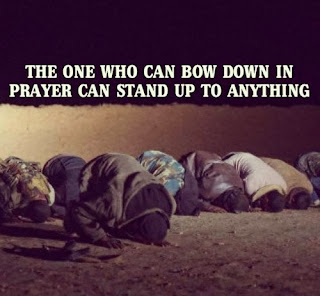I wanted to ask that while asking ALLAH(swt) for
something in the sake of prophet Muhammad ( PBUH) when making duA is
right or not.
Mu' meneen Brothers and Sisters,
As Salaam Aleikum wa Rahmatullahi wa Barakatuh.
(May Allah's Peace, Mercy and Blessings be upon all of you)
One of our brothers/sisters has asked
this question:
ASSALAMUALIKUM WARAHMATULAHI WABARAKATU,
I have
two questions and please answer these with the reference of Quran and sahih
hadith.
1) I
wanted to ask that while asking ALLAH(swt) for something in the sake of prophet
Muhammad ( PBUH) when making duA is right or not. for example like, if i ask
ALLAH to forgive me then can i say ALLAH plz forgive me for the sake of prophet
Muhammad (phub?
2) In pakistan
many people have this great gathering (where people meet and make dua, recite
Quran and then there is this great feast) after 40 days of the deceased. My
question is that is it right to make dua and recite Quran after a specific 40
days as ALLAH has said that dua for deceased should be make everyday? is that
anywhere in Quran?
JAZAKALLAH
KHAIRAN
(There may be some grammatical and spelling
errors in the above statement. The forum does not change anything from
questions, comments and statements received from our readers for circulation in
confidentiality.)
Answer:
Fatiha after forty days deceased
In the name of Allah, We praise Him, seek His help and ask
for His forgiveness. Whoever Allah guides none can misguide, and whoever
He allows to fall astray, none can guide them aright. We bear witness that
there is none worthy of worship but Allah Alone, and we bear witness that
Muhammad (saws) is His slave-servant and the seal of His Messengers.
Your Question: I
wanted to ask that while asking ALLAH(swt) for something in the sake of prophet
Muhammad ( PBUH) when making duA is right or not. for example like, if i ask
ALLAH to forgive me then can i say ALLAH plz forgive me for the sake of prophet
Muhammad ( phub )?
It is permissible and encouraged in Islam to make dua or
supplications for the deceased, but to invoke the deceased, or to
make a supplication to or through the deceased is a
clear and manifest act of the unforgivable and heinous crime of ‘shirk’ in the
Sight of Allah Subhanah.
Allah Says in the Holy Quran Chapter 17 Surah
Israa verse 110:
110 Say: "Call upon Allah or call upon ‘The Rahman’ (The Most
Gracious): by whatever Name ye call upon Him (it is well): for to Him belong
the Most Beautiful Names.
Beloved Brother in Islam, it is absolutely fine,
permissible, acceptable and encouraged to implore and beseech Allah Subhanah
through His Noble Names and Attributes when supplicating to Him; but it is
absolutely impermissible in Islam to use a creation of Allah (even if that
creation happens to be a Prophet, or an Angel, or a Saint, etc.) as an
intermediary when supplicating the Lord Most Gracious.
Allah says in the Holy Quran Chapter 2 Surah
Baqarah verse 186:
And if My
servants ask you, O Prophet, concerning
Me, tell them that I am quite near to them. I hear and answer the prayer
of the suppliant, when he calls on Me.
So let them respond to My call and believe in Me. (Convey this to them), perhaps they may be guided
aright!
Our Lord is indeed the All-Hearing, All-Knowing, and He
indeed hears and responds to those who call upon Him in humility and in
hope. The Messenger of Allah (saws)
himself called upon His Lord directly and without any intermediary day and night,
standing, sitting and lying down; and encouraged the believers to do the
same. Never ever did he encourage or
endorse supplicating Allah Subhanah through an intermediary! In fact, asking or supplicating Allah
Subhanah through dead or absent intermediaries is regarded as a form of ‘shirk’
and ‘disbelief’ in Islam.
Instead of adding ‘weight’ to one’s supplication by using
the name of a dead or absent creation of Allah, the Messenger of Allah (saws)
guided the believers that if indeed they wished to add ‘weight’ to their
supplications to their Lord Most Gracious, they should humbly and in fear,
indicate some amongst their good deeds which they have done purely for the Sake
and Pleasure of Allah Subhanah; for it is one’s own belief and one’s own deeds which
indeed add ‘weight’ to one’s supplications in the Presence of the Lord Most
Merciful.
Sahih Al-Bukhari Hadith 4.671 Narrated by Ibn Umar
Allah's Messenger (saws) said, "Once
three persons (from the previous nations) were traveling, and suddenly it started
raining and they took shelter in a cave. The entrance of the cave got closed
while they were inside. They said to each other, 'O you! Nothing can save you except the truth, so
each of you should ask Allah's help by referring to such a deed as he thinks he
did sincerely (i.e. just for gaining Allah's pleasure).' So one of them said, 'O Allah! You know that
I had a laborer who worked for me for one Faraq (i.e. three Sas) of rice, but
he departed, leaving it (i.e. his wages). I sowed that Faraq of rice and with
its yield I bought cows (for him). Later on when he came to me asking for his
wages, I said (to him), 'Go to those cows and drive them away.' He said to me,
'But you have to pay me only a Faraq of rice,' I said to him, 'Go to those cows
and take them, for they are the product of that Faraq (of rice).' So he drove
them. O Allah! If you consider that I did that for fear of You, then please
remove the rock.' The rock shifted a bit from the mouth of the cave.

The second one said, 'O Allah, You know that
I had old parents whom I used to provide with the milk of my sheep every night.
One night I was delayed and when I came, they had slept, while my wife and
children were crying with hunger. I used not to let them (i.e. my family) drink
unless my parents had drunk first. So I disliked to wake them up and also
disliked that they should sleep without drinking it, I kept on waiting (for
them to wake) till it dawned. O Allah!
If You consider that I did that for fear of you, then please remove the rock.'
So the rock shifted and they could see the sky through it.
The (third) one said, 'O Allah! You know that
I had a cousin (i.e. my paternal uncle's daughter) who was most beloved to me
and I sought to seduce her, but she refused, unless I paid her one-hundred Dinars
(i.e. gold pieces). So I collected the amount and brought it to her, and she
allowed me to sleep with her. But when I sat between her legs, she said, 'Be
afraid of Allah, and do not deflower me but legally. 'I got up and left the
hundred Dinars (for her). O Allah! If You consider that I did that for fear of
you then please remove the rock. So Allah saved them and they came out (of the
cave)."
Allah’s Messenger (saws) guided the believers on how to
best supplicate their Lord Most Merciful:
- Call
upon the Lord Most Merciful through His Noble Attributes and Praise Him.
- In
absolute humility, fear and hope declare one’s own servitude and utter
helplessness in the Presence of their Majestic Lord.
- If
one wishes, one may, in humility and in fear, indicate one’s own good
deeds one may have done for the Sake and Pleasure of Allah Subhanah Alone.
- Then,
beseech the Lord Most Gracious for whatever one wishes.
- And
then in conclusion to the supplication, recite the ‘durood’ or salutation
to the Noble Prophet and his family.
Ibn Mas'ud reported
that the Prophet (saws), said, "If any servant of Allah afflicted with
distress or grief makes this supplication, his supplication will be
accepted: 'O Allah, I am Your servant,
son of Your servant, son of your maidservant.
My forehead is in Your hand.
Your command conceming me prevails, and Your decision concerning me is
just. I call upon You by every one of
the beautiful names by which You have described Yourself, or which You have
revealed in Your book, or have taught anyone of Your creatures, or which You
have chosen to keep in the knowledge of the unseen with You, to make the Qur'an
the delight of my heart, the light of my breast, and remover of my griefs,
sorrows, and afflictions'." A supplication in these words will be
answered. Allah will remove one's
affliction and replace it with joy and happiness.
Salman reported that the Prophet (saws),
said, "Your Lord, the Blessed and the Exalted One, is Modest and Generous,
and He loathes to turn away His servant empty-handed when he raises his hands
to Him in supplication."
Narrated by Ahmad and Ibn Hibban.
Your
Question: …In pakistan
many people have this great gathering (where people meet and make dua, recite
Quran and then there is this great feast) after 40 days of the deceased. My
question is that is it right to make dua and recite Quran after a specific 40
days as ALLAH has said that dua for deceased should be make everyday? is that
anywhere in Quran?
Abu Hurairah reported that The Prophet (saws), said, 'When a
person dies all his good deeds cease except for three: a continuous act of
charity, beneficial knowledge, and a
righteous offspring who prays for him'.''
Related by Muslim and Abu Dawood.
For absolutely all acts of worship, it is absolutely
imperative that the believers always follow what is Declared by Allah and
practiced by His Messenger (saws). There
is absolutely no evidence that the Messenger of Allah (saws), his noble family, or any of his noble companions ever gathered
people at the house of the deceased after a certain number of days (9, 10, 11,
40, etc.) to make dua, or recite the Glorious Quran, or perform the ‘tasbeeh’,
or enjoy a feast in the name of the deceased! Without an iota of a doubt, such
commemorations are no more than innovations which have unfortunately crept into
the pure and perfect deen of Islam; and the believers who sincerely fear Allah
and the Last Day must strive to absolutely abstain from all such innovations.
Sahih Muslim Hadith 1885 Narrated by Jabir ibn Abdullah
That the Prophet of Allah (saws) said in a
sermon: “The best speech is that which
is embodied in the Book of Allah, the Al Quran;
and the best guidance is the guidance given by me, Mohamed (saws). The most evil affairs are the
innovations (bida), and every innovation (bida) is an error.”
Sunan of Abu-Dawood Hadith 4515 Narrated by Ali ibn AbuTalib
That the Prophet of Allah (saws) said: “If
anyone introduces an innovation (bida in religion), he will be responsible for it. If anyone introduces an innovation (bida) or
gives shelter to a man who introduces an innovation (bida), he is cursed by
Allah, by His Angels, and by all the people!”
But what one can and must do is make constant supplication
for his deceased brother/sister in faith to the Merciful Lord, and beseech Him to be Merciful on the
departed soul, forgive his/her sins and grant them an honorable place in
Paradise. This was the practice and the
Sunnah of the Messenger of Allah (saws).
Instead of visiting, consoling, helping, and assisting the
family of the deceased to come to terms with their grief, the ignorant amongst
the people burden them with such innovations as ‘fatihah’ where the deceased’s
family are made to run around to accommodate the gatherers, buy or borrow
copies of the Quran which would be read over the deceased, and prepare an
enormous amount of food to feed those who gather for the ritual!! Not satisfied with putting this physical and
financial burden upon the bereaved family, some amongst the most ignorant even
go to the extent of repeating this innovated ritual on the 1st, 2nd,
3rd, 9th, 10th, 30th and 40th
day of the death of the deceased! Allah
is our witness, this innovated ritual of what is known today as ‘fatihah’ over
the deceased neither helps nor consoles nor lightens the burden of the bereaved
family; but rather increases it!!!
But the ‘deen’ of mercy and the one who was sent as a
‘mercy to the worlds’, Prophet Mohamed (saws) guided the believers to earnestly
supplicate the Lord Most Merciful to have mercy on their deceased brother or
sister, help and assist the bereaved family in any and every which way they
can, feed them during these trying days, share their grief, and help them to
bring their lives back to normal as soon as possible.
If one trusts,
obeys, and follows the guidance
and commands of Allah and His Messenger (saws), one can be assured of never ever being
misled; but if one believes, obeys and follows any other guidance, other than that of Allah and His Messenger
(saws), one can be assured of being led
astray.
Whatever written of Truth and benefit is only due to
Allah’s Assistance and Guidance, and whatever of error is of me alone. Allah Alone Knows Best and He is the Only
Source of Strength.





































